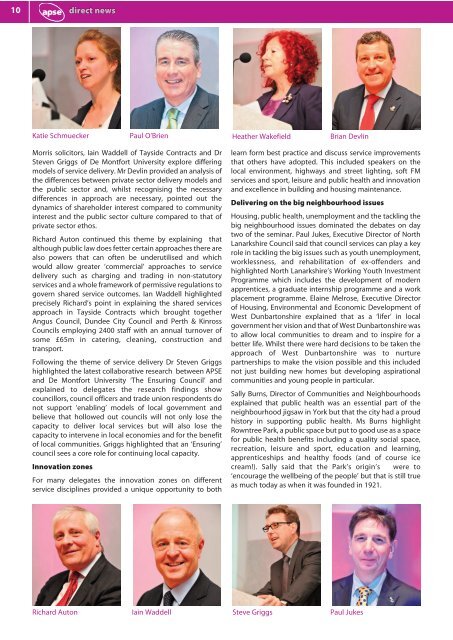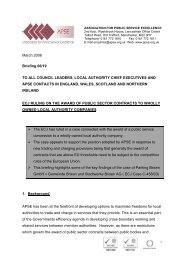Read this edition online - Association for Public Service Excellence
Read this edition online - Association for Public Service Excellence
Read this edition online - Association for Public Service Excellence
Create successful ePaper yourself
Turn your PDF publications into a flip-book with our unique Google optimized e-Paper software.
10 direct news<br />
Katie Schmuecker Paul O’Brien Heather Wakefield Brian Devlin<br />
Morris solicitors, Iain Waddell of Tayside Contracts and Dr<br />
Steven Griggs of De Mont<strong>for</strong>t University explore differing<br />
models of service delivery. Mr Devlin provided an analysis of<br />
the differences between private sector delivery models and<br />
the public sector and, whilst recognising the necessary<br />
differences in approach are necessary, pointed out the<br />
dynamics of shareholder interest compared to community<br />
interest and the public sector culture compared to that of<br />
private sector ethos.<br />
Richard Auton continued <strong>this</strong> theme by explaining that<br />
although public law does fetter certain approaches there are<br />
also powers that can often be underutilised and which<br />
would allow greater ‘commercial’ approaches to service<br />
delivery such as charging and trading in non-statutory<br />
services and a whole framework of permissive regulations to<br />
govern shared service outcomes. Ian Waddell highlighted<br />
precisely Richard’s point in explaining the shared services<br />
approach in Tayside Contracts which brought together<br />
Angus Council, Dundee City Council and Perth & Kinross<br />
Councils employing 2400 staff with an annual turnover of<br />
some £65m in catering, cleaning, construction and<br />
transport.<br />
Following the theme of service delivery Dr Steven Griggs<br />
highlighted the latest collaborative research between APSE<br />
and De Mont<strong>for</strong>t University ‘The Ensuring Council’ and<br />
explained to delegates the research findings show<br />
councillors, council officers and trade union respondents do<br />
not support ‘enabling’ models of local government and<br />
believe that hollowed out councils will not only lose the<br />
capacity to deliver local services but will also lose the<br />
capacity to intervene in local economies and <strong>for</strong> the benefit<br />
of local communities. Griggs highlighted that an ‘Ensuring’<br />
council sees a core role <strong>for</strong> continuing local capacity.<br />
Innovation zones<br />
For many delegates the innovation zones on different<br />
service disciplines provided a unique opportunity to both<br />
learn <strong>for</strong>m best practice and discuss service improvements<br />
that others have adopted. This included speakers on the<br />
local environment, highways and street lighting, soft FM<br />
services and sport, leisure and public health and innovation<br />
and excellence in building and housing maintenance.<br />
Delivering on the big neighbourhood issues<br />
Housing, public health, unemployment and the tackling the<br />
big neighbourhood issues dominated the debates on day<br />
two of the seminar. Paul Jukes, Executive Director of North<br />
Lanarkshire Council said that council services can play a key<br />
role in tackling the big issues such as youth unemployment,<br />
worklessness, and rehabilitation of ex-offenders and<br />
highlighted North Lanarkshire’s Working Youth Investment<br />
Programme which includes the development of modern<br />
apprentices, a graduate internship programme and a work<br />
placement programme. Elaine Melrose, Executive Director<br />
of Housing, Environmental and Economic Development of<br />
West Dunbartonshire explained that as a ‘lifer’ in local<br />
government her vision and that of West Dunbartonshire was<br />
to allow local communities to dream and to inspire <strong>for</strong> a<br />
better life. Whilst there were hard decisions to be taken the<br />
approach of West Dunbartonshire was to nurture<br />
partnerships to make the vision possible and <strong>this</strong> included<br />
not just building new homes but developing aspirational<br />
communities and young people in particular.<br />
Sally Burns, Director of Communities and Neighbourhoods<br />
explained that public health was an essential part of the<br />
neighbourhood jigsaw in York but that the city had a proud<br />
history in supporting public health. Ms Burns highlight<br />
Rowntree Park, a public space but put to good use as a space<br />
<strong>for</strong> public health benefits including a quality social space,<br />
recreation, leisure and sport, education and learning,<br />
apprenticeships and healthy foods (and of course ice<br />
cream!). Sally said that the Park’s origin’s were to<br />
‘encourage the wellbeing of the people’ but that is still true<br />
as much today as when it was founded in 1921.<br />
Richard Auton Iain Waddell<br />
Steve Griggs<br />
Paul Jukes




